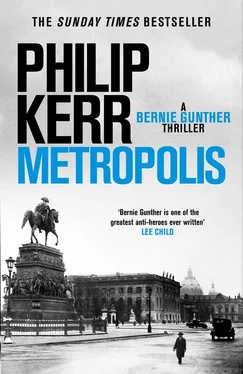‘Bernhard Gunther,’ he said.
‘Buy you a beer?’
‘Sure. I’ll take a beer. And maybe an explanation.’
‘About what?’
‘The Schrader-Verband. What were you doing there?’
‘I pay my dues.’
‘Yes. But there’s the Schrader-Verband and then there’s a drinks party with the right wing of the Schrader-Verband. They’re very different things. One’s a union and the other’s a new way of looking at things.’
‘Maybe I wanted to hear Arthur Nebe talk before I made up my mind about that.’
‘And?’
‘I’ll take a drink with more or less anyone. Listen to anyone, anywhere. Work with anyone if it gets the job done. But when it comes to politics, I’m a natural independent.’
‘Fair enough. But very soon that will be a luxury you can’t afford.’
‘I’m a cop. There are lots of luxuries I can’t afford. But that doesn’t include principles.’
‘You know there are financial advantages for a cop in Berlin to be allied with the Nazis. A cop like you for instance. Expenses. Walking-around money.’
‘Cops get paid to take risks not money.’
‘Oh sure, but this isn’t a bribe. This is just a top-up. I could speak to someone and work something out for you. A little dash of raspberry sauce in your beer, you might say.’
‘I never did like the taste of that. I like my beer just the way it comes out of the tap. Talking of which.’
I went to the bar and brought back some beers.
‘So what can I do for you, Bernie?’
‘Tell me about the rings. And Herr Angerstein.’
‘Any particular reason you mention him?’
‘No reason other than he’s a gangster. Last I heard it’s men like him who are our client base.’
‘There are at least eighty-five underworld clubs in Berlin,’ he told me. ‘Strictly speaking, Angerstein — his given name, by the way, is Erich, in case you’re wondering — isn’t a member of any of them, for the simple reason that he’s part of a syndicate that supervises a large number of these clubs. The Middle German Ring. They impose rules on the clubs, control their activities and exact a financial tribute that is supposed to provide legal assistance for club members. I haven’t met him myself; he’s very private. But from what I’ve heard, he’s to be feared, the kind of man other criminals would obey without question. That makes him very dangerous. Every year he hosts a banquet for the clubs at the Eden Hotel and over a thousand men and women attend. Even a few cops are invited. The Middle German maintains good relations with all the top police councillors and quite a few politicians. Which makes him a man of some influence. If you’re planning to have any dealings with him, son, be careful. That man has very sharp teeth.’
‘Thanks. I’ll bear it in mind.’
‘Almost as sharp as Arthur Nebe’s.’
‘Why should that worry me?’
‘Just don’t get too independent, Bernie. When a cop gets too independent he’s got no friends. And when he’s got no friends, his luck runs out.’
‘And where the hell have you been, Gunther?’
Ernst Gennat was wearing a new suit, but his temper was badly frayed. His eyes were bloodshot and restless, his face was red, and there was a whole shingle beach of sweat on his brow. As usual his pink fists were raised in front of his substantial belly, as if he was ready to fight someone off: me perhaps. His rasping, bass tenor voice was sounding just the one note, a sour one, as if he’d been gargling with vinegar.
‘I’ve been looking for you, Gunther. According to your diary you should be here. And you weren’t. You know the way we work. If you’re out on a case you’re supposed to write it up on the chart outside my office. So that I can keep track of you bastards. At least that’s the theory.’
‘Sorry, boss. I was scratching an itch. I wanted to take another look at the place where Eva Angerstein’s body was found.’
‘Drinking in a bar more like. And didn’t you hear the chief’s order? We’re to lay off the Winnetou cases until we’ve caught Dr Gnadenschuss. Besides, Winnetou hasn’t killed in a while.’
‘You noticed that, too? As a matter of fact, he hasn’t killed since Dr Gnadenschuss started work. Maybe that should tell us something.’
‘It tells me you’re not listening to the orders. Now, listen — no, don’t interrupt, this is important — I want you to equip yourself with a criminalistics kit and then get over to the Mosse building in Friedrichstadt. Apparently the Tageblatt has received another letter from Dr Gnadenschuss, and this time a medal, too. There’s a fingerprint on the letter and I want you to go and take a look at it before the world and his dog have contaminated any possible evidence. Ask for the editor in chief, Theodor Wolff. He’s expecting you. And for Christ’s sake suck some mints before you speak to him. Your breath smells like a brewery.’
‘None of the other papers have received it?’
‘Not as far as I’m aware.’
‘Can I take a car from the pool?’
‘No. Take the tram. It’s quicker at this time of day. And probably safer for a soak like you. Then, as soon as you’re back here, I want you to interview some of these spinners who’ve walked in off the streets to claim responsibility for the Gnadenschuss murders. We’ve got at least five of them locked up in the cells right now.’ He shrugged. ‘One day someone in this department is going to listen to me when I advise against doing something.’
I caught a number 8 from Alexanderplatz going west to Potsdam Station, where I got off and walked northeast. The Mosse publishing group owned a stable of magazines and newspapers, of which the Berliner Tageblatt , with a daily circulation of a quarter of a million, was easily the most important. Even if you didn’t buy it, nearly everyone in Berlin, including me, managed to read the Tageblatt ; it was essential reading for anyone of a vaguely liberal disposition and only the fact that the paper’s owner — Hans Lachmann-Mosse — and editor — Theo Wolff — were both Jews probably prevented Germany’s conservative right wing from reading it, too.
The building where the Mosse group was headquartered was more like a fortress, complete with rusticated walls, enormous iron-bound oak gates and stone balustrades, which probably explained why it had been taken over and fortified by the right-wing Freikorps during the Spartacist uprising of 1919. It was even said that several left-wingers had been executed in the courtyard where now there were dozens of bicycles awaiting the men who would deliver the papers to all corners of the city. Stacked nearby were several giant rolls of newsprint. Just to see the place was to conclude that a free press in Germany was something that needed to be defended at all costs.
I showed my warrant disc to the burly doormen at the castle gates and a lift carried me to the upper floor where the Tageblatt was put together. In the enormous reception area, a messenger boy took my name and then went to find someone while I sat down on a bench along the back wall and amused myself by watching brass capsules drop out of a pneumatic tube into a net next to the main door. It made being a journalist look a lot easier than being a detective. Eventually the boy returned and led me down a long hall in which a whole crowd of trolls, gnomes and goblins might have paid court to some urban mountain-king.
Theo Wolff was almost as powerful, I suppose. As well as founding a political party — the DDP — Wolff had once refused the post of German ambassador to Paris, preferring to remain in journalism, which said a lot for his belief in the importance of newspapers in Germany. He was about sixty, small and pugnacious, and he viewed my arrival in his office with no more enthusiasm than if I’d belonged to the anti-Semitic Hugenberg publishing group. I may have worked for Bernhard Weiss, but the Berlin police wasn’t exactly known for its liberal views.
Читать дальше












